中考专题复习---五时态复习
图片预览
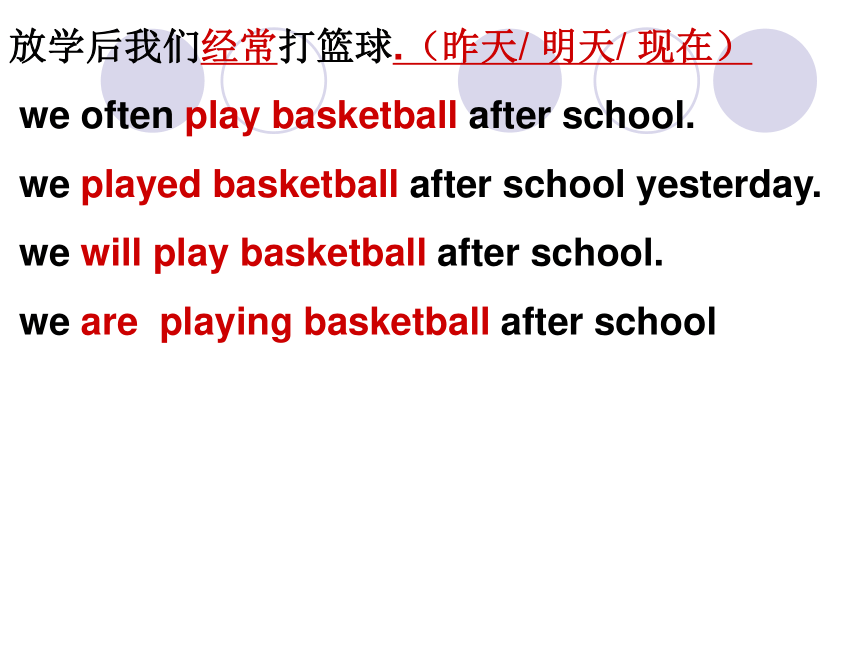
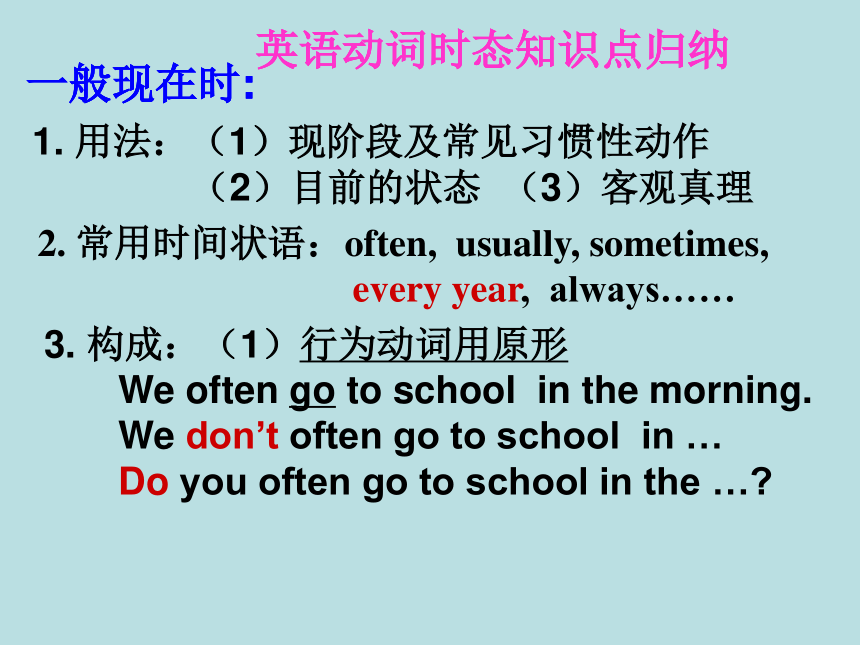
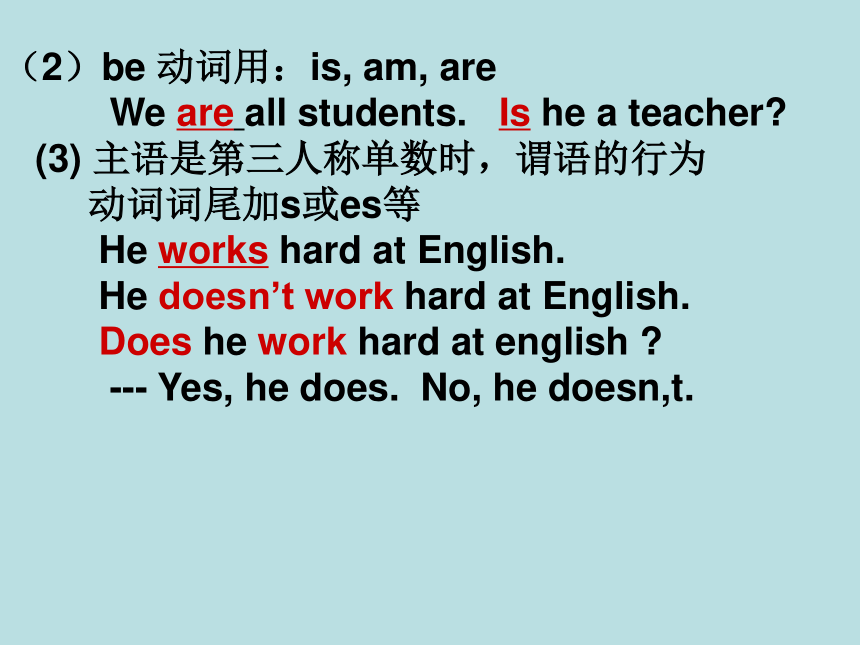
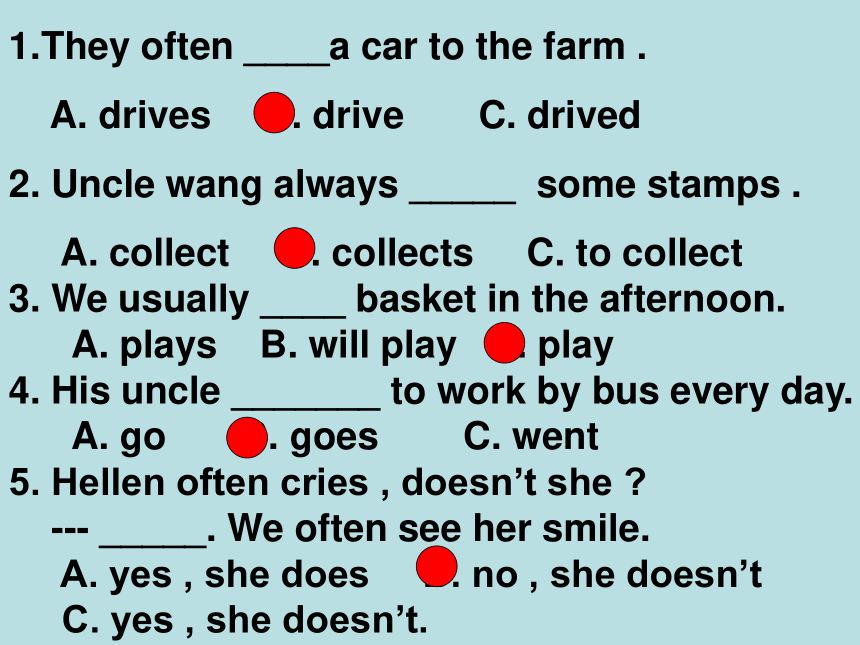
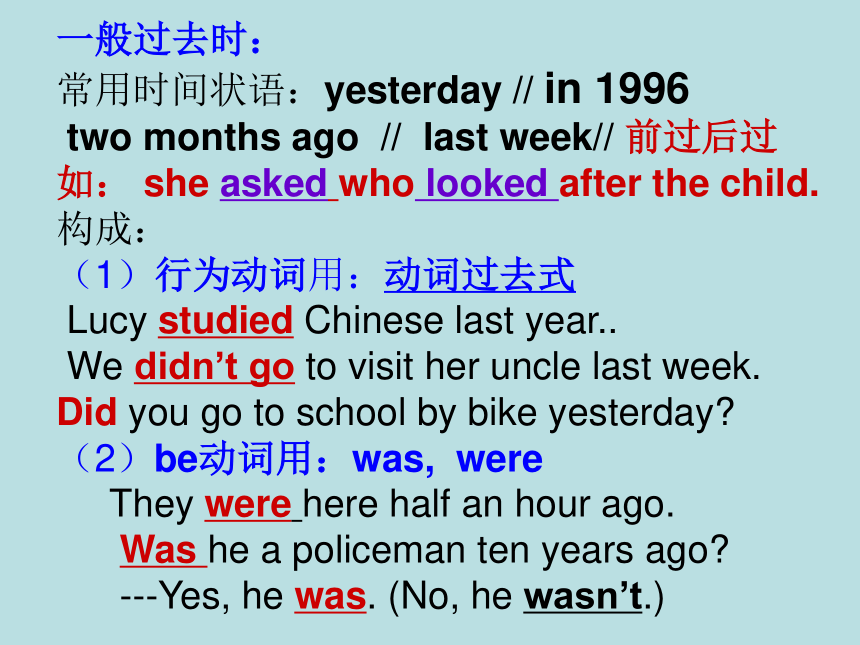
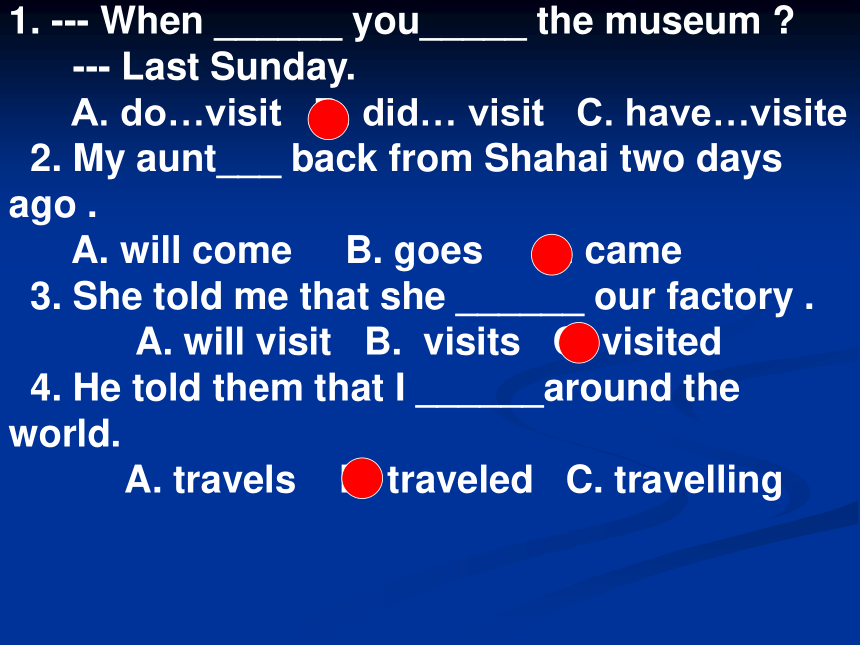
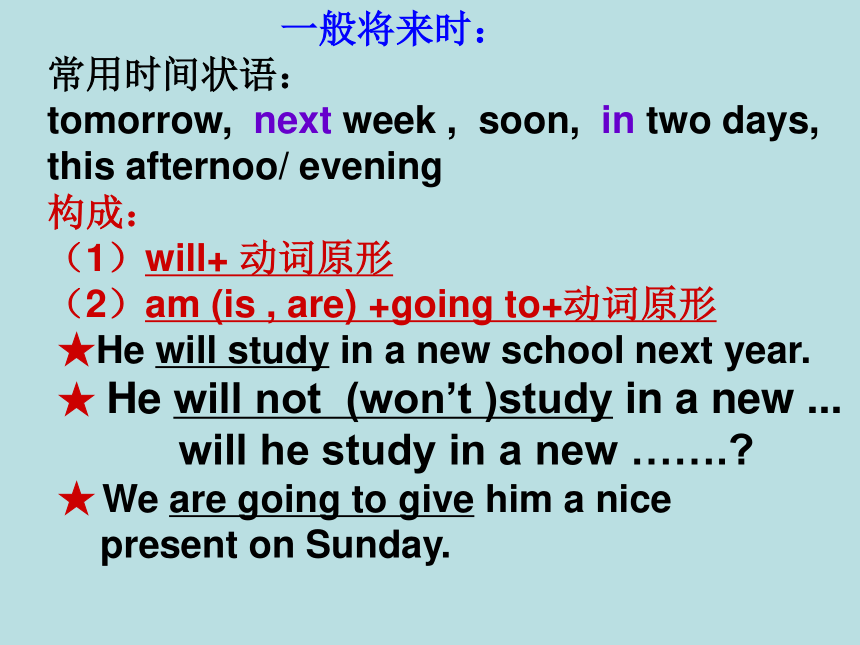
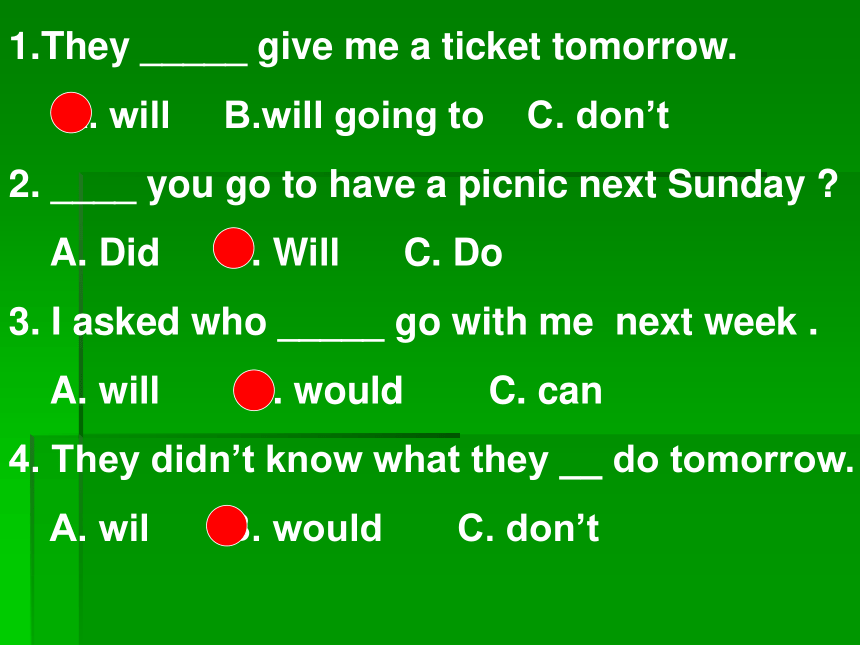
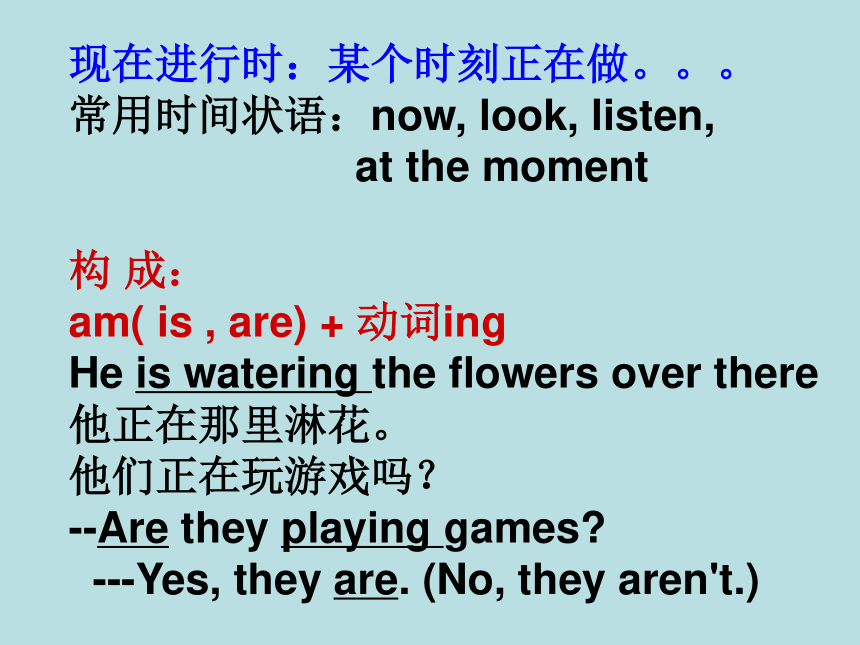
文档简介
课件20张PPT。放学后我们经常打篮球.(昨天/ 明天/ 现在)
we often play basketball after school.
we played basketball after school yesterday.
we will play basketball after school.
we are playing basketball after school
英语动词时态知识点归纳 一般现在时: 2. 常用时间状语:often, usually, sometimes,
every year, always……3. 构成:(1)行为动词用原形
We often go to school in the morning.
We don’t often go to school in …
Do you often go to school in the …?
用法:(1)现阶段及常见习惯性动作
(2)目前的状态 (3)客观真理英语动词时态知识点归纳 一般现在时:英语动词时态知识点归纳 一般现在时:(2)be 动词用:is, am, are
We are all students. Is he a teacher?
(3) 主语是第三人称单数时,谓语的行为
动词词尾加s或es等
He works hard at English.
He doesn’t work hard at English.
Does he work hard at english ?
--- Yes, he does. No, he doesn,t.They often ____a car to the farm .
A. drives B. drive C. drived
2. Uncle wang always _____ some stamps .
A. collect B. collects C. to collect
3. We usually ____ basket in the afternoon.
A. plays B. will play C. play
4. His uncle _______ to work by bus every day.
A. go B. goes C. went
5. Hellen often cries , doesn’t she ?
--- _____. We often see her smile.
A. yes , she does B. no , she doesn’t
C. yes , she doesn’t.
一般过去时:
常用时间状语:yesterday // in 1996
two months ago // last week// 前过后过
如: she asked who looked after the child.
构成:
(1)行为动词用:动词过去式
Lucy studied Chinese last year..
We didn’t go to visit her uncle last week.
Did you go to school by bike yesterday?
(2)be动词用:was, were
They were here half an hour ago.
Was he a policeman ten years ago?
---Yes, he was. (No, he wasn’t.)
--- When ______ you_____ the museum ?
--- Last Sunday.
A. do…visit B. did… visit C. have…visite
2. My aunt___ back from Shahai two days ago .
A. will come B. goes C. came
3. She told me that she ______ our factory .
A. will visit B. visits C. visited
4. He told them that I ______around the world.
A. travels B. traveled C. travelling 一般将来时:
常用时间状语:
tomorrow, next week , soon, in two days,
this afternoo/ evening
构成:
(1)will+ 动词原形
(2)am (is , are) +going to+动词原形
★He will study in a new school next year.
★ He will not (won’t )study in a new ...
will he study in a new …….?
★ We are going to give him a nice
present on Sunday. They _____ give me a ticket tomorrow.
A. will B.will going to C. don’t
2. ____ you go to have a picnic next Sunday ?
A. Did B. Will C. Do
3. I asked who _____ go with me next week .
A. will B. would C. can
4. They didn’t know what they __ do tomorrow.
A. wil B. would C. don’t
现在进行时:某个时刻正在做。。。
常用时间状语:now, look, listen,
at the moment
构 成:
am( is , are) + 动词ing
He is watering the flowers over there
他正在那里淋花。
他们正在玩游戏吗?
--Are they playing games?
---Yes, they are. (No, they aren't.) --- Where is Mike?
---Look! He is over there. He ____ his car.
A. is washing B. wash C. washed
2. Listen ! Mr. Wang_____ a song with Mike.
A. singed B. singing C. is singing
3. My father is watching TV, but my father _____ his newspaper.
A. read B. readed C. is reading
4. He said he ____ his homework at the time.
A. does B. did C. was doing D. is doing
5. When I arrived , they _____ the dinner.
A. cooking B. cooked C. were cooking
1. 一般现在时:
2. 一般过去时:
3. 一般将来时:
4. 现在进行时:经常性或习惯性动作/目前的状态 /客观真理
often, usually, sometimes, every year, always……
过去时间发生的动作/ 一个句子,前过后过
yesterday // in 1996 // two months ago // last week
将来时间发生的动作 / 计划
tomorrow, next week , soon, in two days, this evening
某个时刻正在做。。。
now, look, listen, at the moment
1. 一般现在时:
2. 一般过去时:
3. 一般将来时:
4. 现在进行时:主语是我/你/其它人: 动词用原形
主语是三单: 动词加s/es
动词+ed // 不规则 如: worked // tell---told
Will + 动词原形
Be going to + 动词原形
Be (am / is / are )+ 动词ing
现在完成时:
定义:1.过去发生的动作对现在有一定影响;
2. 过去的动作持续到现在
常用时间状语:just , yet,already,never,
ever,since 2001, for three years
构成:have( has) + 动词过去分词
I have lived here for ten years
( since 1999) (since ten years ago) .
He hasn’t finished the work yet.
他已经做了作业了。
He has finished his homework.
He hasn’t finished his homework.
Has he finished his homework?
--- yes, he has // --- no, he hasn’t
现在完成时
Δ区别:
I have taught English since 2003 ( for five years) (现在完成时)
2. I taught English in 2003.
(一般过去时)
3. for two years = since two years ago
=since 2007
for + 一段时间
since + 过去的某个一时间
现在完成时
have (has) been 表示“到过某地,已回来”
have( has) gone表示“已经去某地了,没回来”。
Δ重点、难点:表示瞬间动作的动词 (如:arrive borrow buy come go die leave lose等)用于现在完成时,不能与表示一段时间的状语连用。
He has bought a computer.( √)
He has bought a computer for a year.( ×)
He has had a computer for a year.( √)
【运用】
请用括号内所给动词的正确时态填空。
1. Frank ______ (help) his mother with the housework on Sundays.
2. I _________(become) a middle school student three years ago.
3. —Hello! May I speak to your father, please?
—Sorry, my father ___________(go) to Shanghai. He went there this morning.
4. They ________________________(have) eggs and bread for breakfast tomorrow morning.
5. He ______________(cross) the street when he was hit by a bike.helpsbecamehas gonewill / are going to havewas crossing 1. I _________ my homework. I can go now.
A. am doing B. have finished C. finish
2. --- __ your father ever___ to Shanghai?
--- No, never.
A. Did…. go B. Does.. go C. Has.. Been
3. They have bought some food , haven’t they?
--- ______. The fridge is empty.
A. yes , they have B. no, they have
C. no , they haven’t
4. Where is John ?--- He ____ Beijing.
A. has gone to B. has been to C. has to---- How does his father go to work?
--- He _____ a bike to work.
A. road B. is riding C. rides
2. ---When ______ you_____ your teeth, Billy? ---- Ten minutes ago.
A. do… brush B. have…. brushed
C. did…. brush
3. His children _________ at their uncle’s house last night.
A. were B. was C. are
4. Look at the sky! The bird______.
A. is flying B. flies C. fly 5. Mr. Brown____ in this city since 2000.
A. lived B. lives C. has lived
6. --- I called you yesterday evening, but
there was no answer. --- Oh,
I________ dinner at my friend’s home.
A. have B. had C. was having
7. ---- Have you returned the library book yet?
----Not yet. Don’t worry. I ____ it soon.
A. returned B. will return C. have returned
8. Don’t make so much noise. The students_________ an English class.
A. are having B. have C. were having
we often play basketball after school.
we played basketball after school yesterday.
we will play basketball after school.
we are playing basketball after school
英语动词时态知识点归纳 一般现在时: 2. 常用时间状语:often, usually, sometimes,
every year, always……3. 构成:(1)行为动词用原形
We often go to school in the morning.
We don’t often go to school in …
Do you often go to school in the …?
用法:(1)现阶段及常见习惯性动作
(2)目前的状态 (3)客观真理英语动词时态知识点归纳 一般现在时:英语动词时态知识点归纳 一般现在时:(2)be 动词用:is, am, are
We are all students. Is he a teacher?
(3) 主语是第三人称单数时,谓语的行为
动词词尾加s或es等
He works hard at English.
He doesn’t work hard at English.
Does he work hard at english ?
--- Yes, he does. No, he doesn,t.They often ____a car to the farm .
A. drives B. drive C. drived
2. Uncle wang always _____ some stamps .
A. collect B. collects C. to collect
3. We usually ____ basket in the afternoon.
A. plays B. will play C. play
4. His uncle _______ to work by bus every day.
A. go B. goes C. went
5. Hellen often cries , doesn’t she ?
--- _____. We often see her smile.
A. yes , she does B. no , she doesn’t
C. yes , she doesn’t.
一般过去时:
常用时间状语:yesterday // in 1996
two months ago // last week// 前过后过
如: she asked who looked after the child.
构成:
(1)行为动词用:动词过去式
Lucy studied Chinese last year..
We didn’t go to visit her uncle last week.
Did you go to school by bike yesterday?
(2)be动词用:was, were
They were here half an hour ago.
Was he a policeman ten years ago?
---Yes, he was. (No, he wasn’t.)
--- When ______ you_____ the museum ?
--- Last Sunday.
A. do…visit B. did… visit C. have…visite
2. My aunt___ back from Shahai two days ago .
A. will come B. goes C. came
3. She told me that she ______ our factory .
A. will visit B. visits C. visited
4. He told them that I ______around the world.
A. travels B. traveled C. travelling 一般将来时:
常用时间状语:
tomorrow, next week , soon, in two days,
this afternoo/ evening
构成:
(1)will+ 动词原形
(2)am (is , are) +going to+动词原形
★He will study in a new school next year.
★ He will not (won’t )study in a new ...
will he study in a new …….?
★ We are going to give him a nice
present on Sunday. They _____ give me a ticket tomorrow.
A. will B.will going to C. don’t
2. ____ you go to have a picnic next Sunday ?
A. Did B. Will C. Do
3. I asked who _____ go with me next week .
A. will B. would C. can
4. They didn’t know what they __ do tomorrow.
A. wil B. would C. don’t
现在进行时:某个时刻正在做。。。
常用时间状语:now, look, listen,
at the moment
构 成:
am( is , are) + 动词ing
He is watering the flowers over there
他正在那里淋花。
他们正在玩游戏吗?
--Are they playing games?
---Yes, they are. (No, they aren't.) --- Where is Mike?
---Look! He is over there. He ____ his car.
A. is washing B. wash C. washed
2. Listen ! Mr. Wang_____ a song with Mike.
A. singed B. singing C. is singing
3. My father is watching TV, but my father _____ his newspaper.
A. read B. readed C. is reading
4. He said he ____ his homework at the time.
A. does B. did C. was doing D. is doing
5. When I arrived , they _____ the dinner.
A. cooking B. cooked C. were cooking
1. 一般现在时:
2. 一般过去时:
3. 一般将来时:
4. 现在进行时:经常性或习惯性动作/目前的状态 /客观真理
often, usually, sometimes, every year, always……
过去时间发生的动作/ 一个句子,前过后过
yesterday // in 1996 // two months ago // last week
将来时间发生的动作 / 计划
tomorrow, next week , soon, in two days, this evening
某个时刻正在做。。。
now, look, listen, at the moment
1. 一般现在时:
2. 一般过去时:
3. 一般将来时:
4. 现在进行时:主语是我/你/其它人: 动词用原形
主语是三单: 动词加s/es
动词+ed // 不规则 如: worked // tell---told
Will + 动词原形
Be going to + 动词原形
Be (am / is / are )+ 动词ing
现在完成时:
定义:1.过去发生的动作对现在有一定影响;
2. 过去的动作持续到现在
常用时间状语:just , yet,already,never,
ever,since 2001, for three years
构成:have( has) + 动词过去分词
I have lived here for ten years
( since 1999) (since ten years ago) .
He hasn’t finished the work yet.
他已经做了作业了。
He has finished his homework.
He hasn’t finished his homework.
Has he finished his homework?
--- yes, he has // --- no, he hasn’t
现在完成时
Δ区别:
I have taught English since 2003 ( for five years) (现在完成时)
2. I taught English in 2003.
(一般过去时)
3. for two years = since two years ago
=since 2007
for + 一段时间
since + 过去的某个一时间
现在完成时
have (has) been 表示“到过某地,已回来”
have( has) gone表示“已经去某地了,没回来”。
Δ重点、难点:表示瞬间动作的动词 (如:arrive borrow buy come go die leave lose等)用于现在完成时,不能与表示一段时间的状语连用。
He has bought a computer.( √)
He has bought a computer for a year.( ×)
He has had a computer for a year.( √)
【运用】
请用括号内所给动词的正确时态填空。
1. Frank ______ (help) his mother with the housework on Sundays.
2. I _________(become) a middle school student three years ago.
3. —Hello! May I speak to your father, please?
—Sorry, my father ___________(go) to Shanghai. He went there this morning.
4. They ________________________(have) eggs and bread for breakfast tomorrow morning.
5. He ______________(cross) the street when he was hit by a bike.helpsbecamehas gonewill / are going to havewas crossing 1. I _________ my homework. I can go now.
A. am doing B. have finished C. finish
2. --- __ your father ever___ to Shanghai?
--- No, never.
A. Did…. go B. Does.. go C. Has.. Been
3. They have bought some food , haven’t they?
--- ______. The fridge is empty.
A. yes , they have B. no, they have
C. no , they haven’t
4. Where is John ?--- He ____ Beijing.
A. has gone to B. has been to C. has to---- How does his father go to work?
--- He _____ a bike to work.
A. road B. is riding C. rides
2. ---When ______ you_____ your teeth, Billy? ---- Ten minutes ago.
A. do… brush B. have…. brushed
C. did…. brush
3. His children _________ at their uncle’s house last night.
A. were B. was C. are
4. Look at the sky! The bird______.
A. is flying B. flies C. fly 5. Mr. Brown____ in this city since 2000.
A. lived B. lives C. has lived
6. --- I called you yesterday evening, but
there was no answer. --- Oh,
I________ dinner at my friend’s home.
A. have B. had C. was having
7. ---- Have you returned the library book yet?
----Not yet. Don’t worry. I ____ it soon.
A. returned B. will return C. have returned
8. Don’t make so much noise. The students_________ an English class.
A. are having B. have C. were having
同课章节目录
- 词法
- 名词
- 动词和动词短语
- 动词语态
- 动词时态
- 助动词和情态动词
- 非谓语动词
- 冠词
- 代词
- 数词和量词
- 形容词副词及其比较等级
- 介词和介词短语
- 连词和感叹词
- 构词法
- 相似、相近词比较
- 句法
- 陈述句
- 一般疑问句和否定疑问句
- 特殊疑问句及选择疑问句
- 反意疑问句
- 存在句(There be句型)
- 宾语从句
- 定语从句
- 状语从句
- 主谓一致问题
- 简单句
- 并列句
- 复合句
- 主谓一致
- 主、表语从句
- 名词性从句
- 直接引语和间接引语
- 虚拟语气
- 感叹句
- 强调句
- 倒装句
- 祈使句
- 句子的成分
- 句子的分类
- 题型专区
- 单项选择部分
- 易错题
- 完形填空
- 阅读理解
- 词汇练习
- 听说训练
- 句型转换
- 补全对话
- 短文改错
- 翻译
- 书面表达
- 任务型阅读
- 语法填空
- 其他资料
